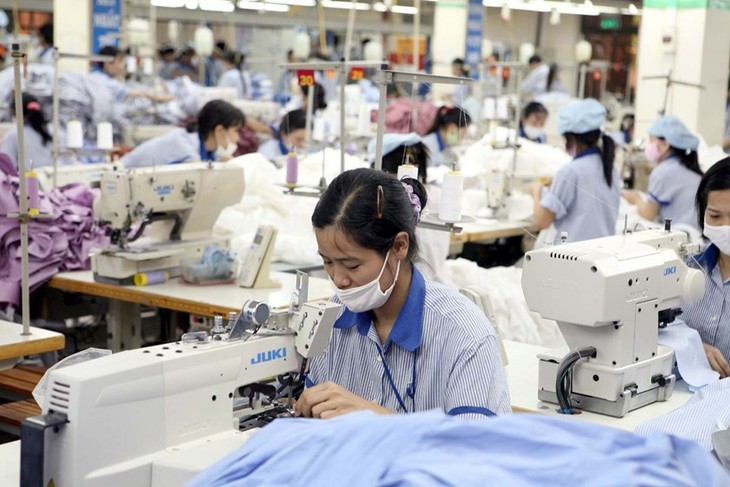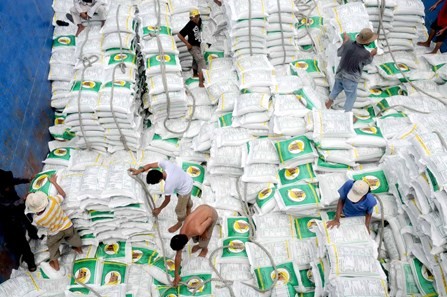(VOVworld) – Vietnam will soon sign a number of free trade agreements with major partners, most notably the Trans-Pacific Partnership (TPP) agreement, whose final negotiations are expected to be completed by the end of this year. This will create a great opportunity for Vietnam to penetrate larger and more diversified markets and reduce its over-dependence on its current markets.
The TPP agreement is now in its 20th round of negotiations and is expected to be completed by the end of this year. The negotiators are trying to eliminate 100% of tariffs on imports, of which 90% right after the agreement takes effect. The TPP countries produce 40% of global GDP and 30% of global import-export revenues. Once the agreement is signed, Vietnamese products will have ample opportunities to directly penetrate powerful markets like the US, Canada, Mexico, and Japan.

To reduce Vietnam's reliance on China, the long term measure is to improve local supporting industries. (Photo: Ngoc Thang)
|
The Vietnamese garment sector is one industry that will gain many advantages from the TPP agreement. Roughly 1,000 tax lines on garment products exported to the US, Vietnam’s biggest market, will be slashed to zero from the current 18%. Garment exports should continue to grow 20% annually and could reach 50 billion USD by 2025. But to benefit from the trade pact, the garment sector must meet certain conditions including a certificate of origin (C/O) on materials used.
Dang Phuong Dung, Secretary General of the Vietnam Textile and Apparel Association (VITAS), says that to make full use of the TPP deal, Vietnamese garment businesses must renovate their technology, invest in materials production, create closed production process, increase the proportion of domestic materials used, and boost added values for products. Dung explains further:
“The most challenging requirement for Vietnam is to make products from domestic materials. Even for other TPP member countries, this is a tough task. Thus the sector has no other choice but to develop material growing areas. The association is preparing to train and shift from outsourcing to modern production methods to increase added value for products.”
This year Vietnam is also negotiating a number of other important FTA agreements with the European Union, the Republic of Korea, and the Customs Union, which includes Russia, Belarus, and Kazakhstan.
These agreements will help Vietnam expand its export markets, especially for agricultural products. Tran Huu Huynh, Chairman of the Vietnam International Arbitration Center, says strict requirements in these agreements will force domestic businesses to improve their competitiveness to join the global value chain and play by the rules. Huynh says: “Vietnamese enterprises should really better themselves because these agreements will offer both opportunities and challenges.”

Vietnam should seek boosting trade with EU to reduce its heavy reliance on the Chinese market, says NA deputy Vu Tien Loc (File photo)
|
With these agreements, Vietnam’s imports will also benefit. State-of-the-art machinery and equipment from developed countries will be available for import at reasonable prices. Machinery and equipment imports from the EU rose from 2.6 billion USD in 2005 to 7.6 billion USD five years later. Tariff cuts will help Vietnam import even higher quality machinery and equipment at even lower prices, gradually reducing the trade deficit with China. Vietnam is working hard to finalize the free trade agreements to help Vietnamese businesses expand their markets overseas. Minister of Industry and Trade Vu Huy Hoang says: “the Government’s guideline is to diversify new import-export markets to avoid overdependence on any one partner. If negotiations are successful, there will be greater potential for Vietnamese exports to penetrate global markets. The Government will create an opportunity for businesses to accelerate exports more stably and sustainably.”
In anticipation of the agreements, Vietnam should develop promotion programs for each field, draw up detailed plans for materials growing areas, and sustainably develop the support industry. The Government will soon issue support policy guidelines for garment, footwear, and agriculture businesses to maximize the benefits of the FTAs.
Viet Ha